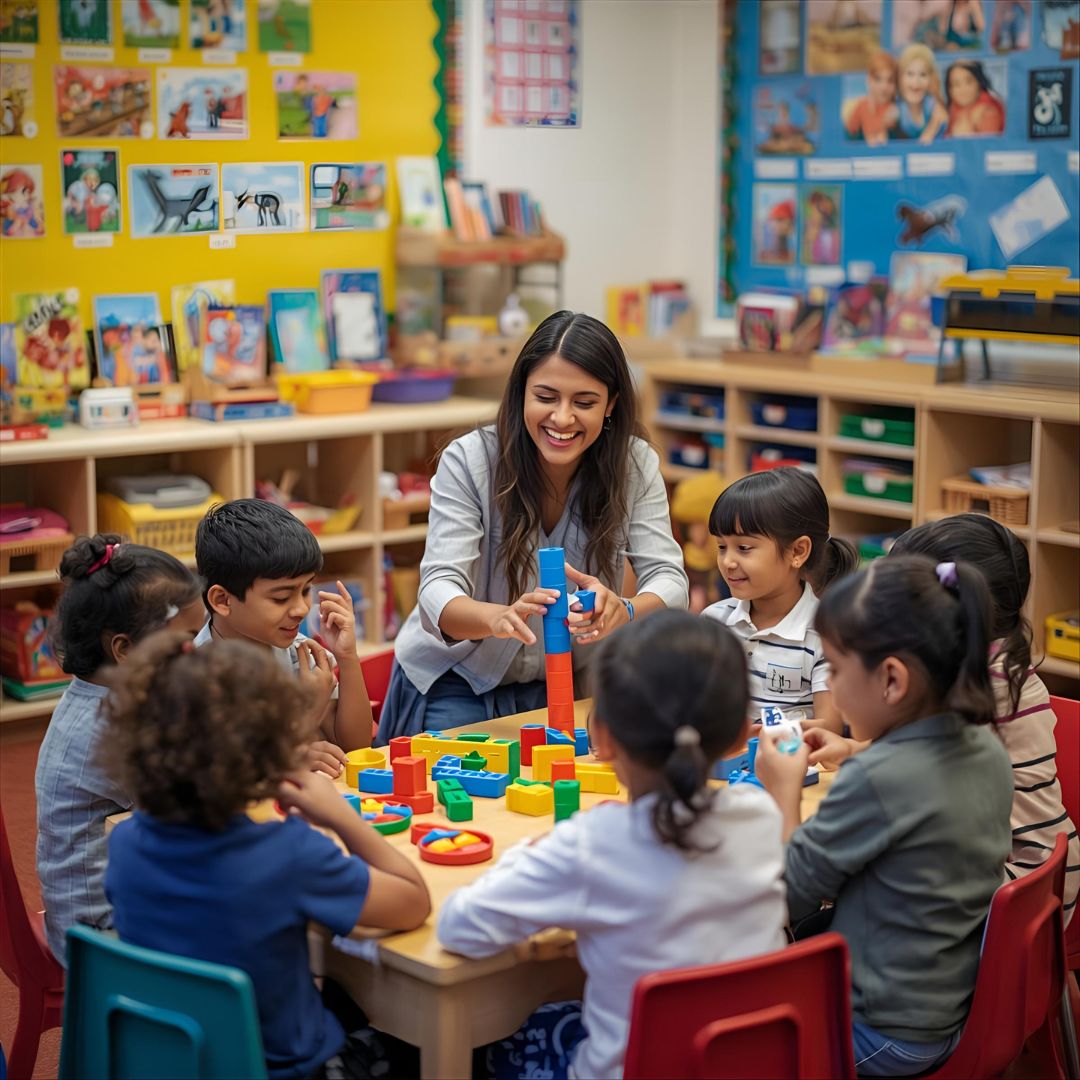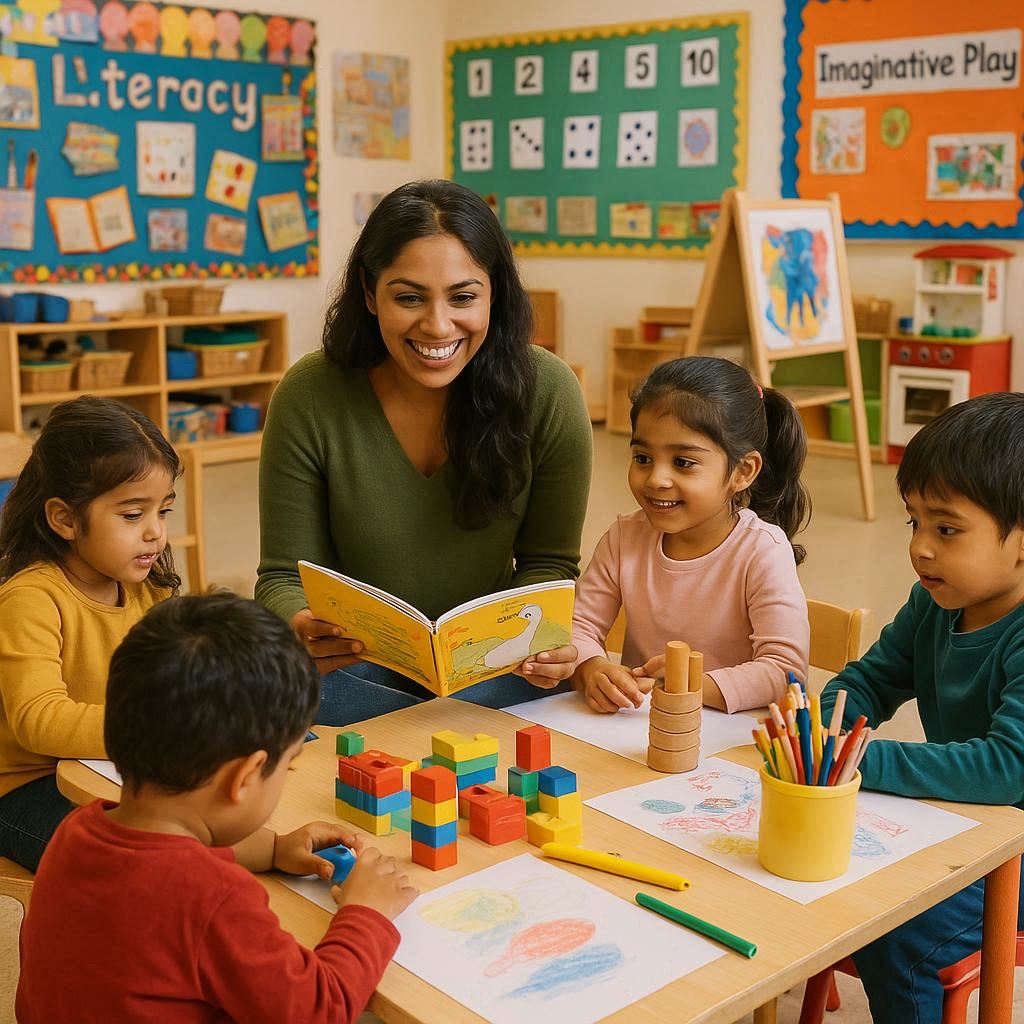Early childhood is the most formative phase of a child’s life. From the first steps to the first friendships, every experience builds the foundation for future success. This is why both global and national education systems have developed structured frameworks to nurture children in their early years. The EYFS (Early Years Foundation Stage) and the NEP 2020 (National Education Policy) are two such frameworks that guide how preschoolers learn, grow, and prepare for the real world.
Upward International Preschool & DayCare in Thane West plays a crucial role in shaping early learning foundations, especially when aligned with proven early-years frameworks like EYFS and NEP 2020. Parents today want clarity on how these systems prepare young learners for real-world challenges, and this comparison helps you understand their impact.
But how exactly does the EYFS framework prepare preschoolers for life beyond the classroom? And how does it align with India’s NEP 2020? Let’s dive deeper.

Understanding the EYFS Framework
The EYFS is a comprehensive framework that sets the standards for early childhood education for children from birth to 5 years. It emphasizes that children learn best through play, exploration, and active engagement rather than rote memorization.
The framework focuses on seven areas of learning and development, split into:
Prime Areas
- Communication and Language – Encourages children to express themselves, listen attentively, and develop a strong foundation for literacy.
- Physical Development – Focuses on motor skills, coordination, health, and self-care.
- Personal, Social, and Emotional Development (PSED) – Builds confidence, self-awareness, resilience, and the ability to form healthy relationships.
Specific Areas
- Literacy – Developing phonics, early reading, and writing skills through stories, rhymes, and print awareness.
- Mathematics – Hands-on experiences with numbers, shapes, patterns, and simple problem-solving.
- Understanding the World – Exploring the environment, cultures, traditions, technology, and early science concepts.
- Expressive Arts and Design – Encouraging creativity through music, art, dance, and imaginative play.
Together, these areas ensure that preschoolers not only develop academic foundations but also the life skills needed to thrive in the real world.
NEP 2020 and the Foundational Stage in India
India’s National Education Policy 2020 also places strong emphasis on early childhood education. It introduces a 5+3+3+4 curricular structure, where the first five years (ages 3–8) are called the Foundational Stage. This stage includes:
- 3 years of preschool/play-based learning (ages 3–6)
- Grades 1 and 2 (ages 6–8)
Like EYFS, NEP 2020 advocates for play-based, discovery-led learning that fosters creativity, communication, and problem-solving instead of rote memorization.
It emphasizes:
- Developmentally appropriate practices.
- Multilingual exposure and strong foundations in language.
- Inclusion of health, nutrition, and socio-emotional well-being in early education.
- Integration of local culture, art, and values into everyday learning.
This makes NEP 2020 quite aligned with global best practices like EYFS, while adapting them to the Indian cultural context.
How EYFS Prepares Preschoolers for the Real World
1. Building Communication and Confidence
Children who can express themselves confidently are better equipped to navigate social and academic challenges. EYFS prioritizes language development from an early age, giving children tools to communicate effectively—whether it’s asking for help, sharing an idea, or making a new friend.
📌 NEP 2020 Parallel: NEP also stresses multilingual learning and developing strong communication skills early on.
2. Encouraging Independence and Responsibility
From putting away toys to washing hands, EYFS encourages small acts of independence. These daily routines prepare children for self-reliance and responsibility in real-world situations.
📌 NEP 2020 Parallel: The NEP recognizes the importance of life skills, including self-care and practical knowledge, as part of foundational learning.
3. Fostering Emotional Intelligence
Real-world success is not just about academics but also about resilience, empathy, and adaptability. EYFS builds emotional maturity by teaching children how to manage frustrations, work in teams, and respect differences.
📌 NEP 2020 Parallel: The NEP highlights socio-emotional development as a critical learning outcome, focusing on values, cooperation, and emotional balance.
4. Promoting Problem-Solving and Creativity
EYFS activities often involve open-ended play—building blocks, role play, puzzles—which stimulate curiosity and problem-solving. These skills are essential in the real world, where challenges rarely have one right answer.
📌 NEP 2020 Parallel: NEP’s play-based curriculum also stresses hands-on activities, storytelling, and experiential learning to encourage creativity and critical thinking.
5. Introducing Global Awareness and Cultural Respect
Through “Understanding the World,” EYFS introduces children to different cultures, communities, and traditions. This helps them develop respect for diversity—an essential trait in today’s interconnected world.
📌 NEP 2020 Parallel: NEP places emphasis on Indian culture, values, and heritage while also preparing children for global citizenship.
6. Preparing for Academic Success Without Pressure
EYFS gradually introduces literacy and numeracy through play—counting with toys, recognizing letters in stories, drawing shapes in sand. This creates a natural love for learning instead of fear of academics.
📌 NEP 2020 Parallel: NEP ensures that the Foundational Literacy and Numeracy (FLN) mission is at the core of early education, but delivered through joyful, play-based methods.
EYFS vs NEP 2020 – A Shared Vision
While EYFS is a well-established global model and NEP 2020 is India’s latest reform, both frameworks share a common philosophy:
- Learning should be joyful, engaging, and developmentally appropriate.
- Play-based exploration is the key to deeper understanding.
- Holistic development—physical, emotional, social, and cognitive—is more important than rote academics.
Where EYFS offers a structured, globally tested approach, NEP 2020 adapts similar principles for India’s diverse contexts, ensuring accessibility and inclusivity.
Conclusion
The EYFS framework prepares preschoolers for the real world by going beyond academics. It equips children with communication, independence, emotional intelligence, problem-solving skills, and cultural awareness—traits that matter for lifelong success.
Similarly, India’s NEP 2020 recognises the value of early years and aligns closely with global best practices. Together, these frameworks highlight a powerful truth: the early years are not just preparation for school, but preparation for life itself.
By choosing an early education system rooted in EYFS principles or NEP-aligned approaches, parents can be assured that their children are not just learning alphabets and numbers but developing into confident, capable, and compassionate individuals ready to face the future.
❓ FAQs (SEO-rich, parent-friendly)
1. What is the EYFS framework in early childhood education?
The EYFS (Early Years Foundation Stage) is a framework for children from birth to 5 years. It focuses on play-based learning in seven areas of development, including communication, social-emotional growth, and literacy.
2. How does the EYFS prepare preschoolers for the real world?
EYFS equips children with life skills such as independence, communication, problem-solving, and emotional resilience. It also fosters creativity and respect for diversity—traits essential beyond school.
3. What does NEP 2020 say about early childhood education in India?
The NEP 2020 introduces a Foundational Stage (ages 3–8), which emphasizes play-based learning, foundational literacy and numeracy, social-emotional skills, and cultural awareness.
4. How is EYFS similar to NEP 2020?
Both EYFS and NEP 2020 value holistic development, play-based exploration, communication skills, and social-emotional well-being. While EYFS is a global framework, NEP adapts these principles to India’s context.

